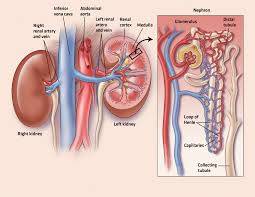Certainly, here are 20 potential causes, signs and symptoms, effects, and solutions for Chronic Kidney Disease (CKD):
**Causes:**
1. High blood pressure (hypertension)
2. Diabetes
3. Glomerulonephritis (inflammation of kidney filters)
4. Polycystic kidney disease (a genetic disorder)
5. Kidney infections
6. Kidney stones
7. Urinary tract obstructions
8. Autoimmune diseases affecting the kidneys
9. Medication side effects (e.g., NSAIDs)
10. Congenital kidney abnormalities
11. Dehydration
12. Smoking
13. Obesity
14. High cholesterol
15. Family history of kidney disease
16. Cardiovascular disease
17. Age-related decline in kidney function
18. Lupus and other autoimmune conditions
19. HIV/AIDS
20. Hepatitis B and C
**Signs and Symptoms:**
1. Fatigue
2. Swelling of the ankles, legs, or face (edema)
3. High blood pressure
4. Foamy or bloody urine
5. Increased or decreased urination
6. Difficulty concentrating
7. Appetite loss
8. Nausea and vomiting
9. Itchy skin
10. Muscle cramps and twitches
11. Metallic taste in the mouth
12. Shortness of breath
13. Bone pain and fractures
14. Persistent headaches
15. Sleep disturbances
16. Dry, flaky skin
17. Weight loss
18. Puffy eyes
19. Restless legs
20. Difficulty sleeping due to frequent urination at night
**Effects and Solutions:**
1. **Reduced kidney function**: Management through medication and lifestyle changes.
2. **Fluid and electrolyte imbalance**: Dietary restrictions and medications.
3. **Hypertension**: Blood pressure control through medication and lifestyle changes.
4. **Anemia**: Medication, iron supplements, and dietary changes.
5. **Swelling (edema)**: Diuretics and fluid restriction.
6. **Uremia (toxins in the blood)**: Dialysis or kidney transplant.
7. **Bone problems**: Supplements and medications to address bone health.
8. **Cardiovascular issues**: Heart-healthy diet and medications.
9. **Anxiety and depression**: Mental health support and counseling.
10. **Sleep disturbances**: Management of underlying causes.
11. **Malnutrition**: Dietary counseling and supplements.
12. **Itchy skin**: Medications and skin care.
13. **Loss of appetite**: Dietary counseling and appetite stimulants.
14. **Nausea and vomiting**: Medications to control symptoms.
15. **Muscle cramps**: Dietary changes, medications, and hydration.
16. **Weight loss**: Nutritional support and addressing underlying issues.
17. **Bone pain and fractures**: Medications, supplements, and bone health management.
18. **Persistent headaches**: Pain management and addressing underlying causes.
19. **Skin issues**: Skin care and management of underlying causes.
20. **Restless legs and sleep disturbances**: Medications and lifestyle changes to improve sleep.
The management of CKD involves a combination of medical treatments, lifestyle changes, and dietary adjustments. It's important to work closely with healthcare professionals to develop a personalized treatment plan based on the individual's specific circumstances and the stage of CKD.



No comments yet
Be the first to share your thoughts!